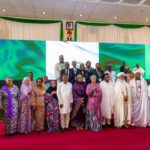In a major step towards tackling the escalating problem of drug abuse and trafficking across West Africa, the Economic Community of West African States (ECOWAS) has pledged its full support to Nigeria in developing a new National Drug Control Master Plan (NDCMP) a comprehensive framework aimed at strengthening the country’s national response to drug-related challenges.
The initiative, launched through a four-day stakeholders’ workshop taking place from October 6th to 9th, 2025, in Abuja, marks a significant milestone in Nigeria’s ongoing efforts to combat the drug menace that continues to threaten the health, security, and social fabric of its society. The workshop brings together over 30 key national actors, including representatives from the National Drug Law Enforcement Agency (NDLEA), the Federal Ministry of Health, and Civil Society Organisations (CSOs), among others.
Speaking on behalf of Prof. Fatou Sow Sarr, the ECOWAS Commissioner for Human Development and Social Affairs, the Principal Programme Officer and Head of the ECOWAS Drug Prevention and Control Division, Dr. Daniel Amankwaah, said the collaborative effort underscores ECOWAS’s commitment to building an integrated and evidence-driven response to the region’s growing drug problem.
Dr. Amankwaah explained that the new master plan will focus on enhancing coordination among stakeholders, improving drug prevention and treatment strategies, and aligning national policies with regional and international standards. “This partnership with Nigeria is part of ECOWAS’s broader mission to strengthen member states’ institutional capacities and promote a unified approach to combating drug abuse and trafficking across West Africa,” he said.
The Chairman and Chief Executive Officer of the NDLEA, Brigadier General Mohamed Buba Marwa (Rtd.), reaffirmed Nigeria’s determination to lead the process and ensure the development of a robust framework that integrates prevention, treatment, enforcement, and rehabilitation efforts. He noted that the new National Drug Control Master Plan would serve as a blueprint for implementing sustainable solutions that address both the supply and demand sides of the drug crisis.
“This plan will not only guide our national efforts but also strengthen our partnerships with regional and international bodies working to curb drug trafficking and abuse,” Marwa said. “We are determined to ensure that the new framework is inclusive, data-driven, and effective in addressing the multifaceted nature of the problem.”
According to ECOWAS, the initiative comes at a crucial time when the region is witnessing a surge in drug trafficking activities, with West Africa increasingly being used as a transit corridor for narcotics destined for Europe and other parts of the world. The rise in local drug consumption and addiction has also triggered public health concerns and social instability in many member states.
The forthcoming master plan is expected to provide Nigeria with a comprehensive roadmap for policy formulation and action on drug prevention, treatment, rehabilitation, and law enforcement. It will also ensure better alignment between Nigeria’s domestic strategies and ECOWAS’s regional drug control priorities, as well as compliance with international conventions under the United Nations Office on Drugs and Crime (UNODC).
Health experts and policy advocates have hailed the collaboration as a critical step toward reversing the trend of substance abuse in Nigeria, especially among young people. By fostering coordination between government agencies, civil society, and international partners, the initiative aims to promote a whole-of-society approach to addressing drug-related issues.
As the workshop continues, participants are expected to identify key priorities, share best practices, and outline implementation strategies that reflect Nigeria’s unique challenges and opportunities. Once finalised, the National Drug Control Master Plan will serve as a guiding document for the next five years, reinforcing Nigeria’s position as a regional leader in the fight against drug abuse and trafficking.
The ECOWAS-backed framework is not just a response to a crisis it represents a renewed commitment to public health, social stability, and human development across the West African region. By investing in prevention, treatment, and international cooperation, Nigeria and ECOWAS are charting a new course toward a drug-free, safer, and more resilient society.













Leave a comment